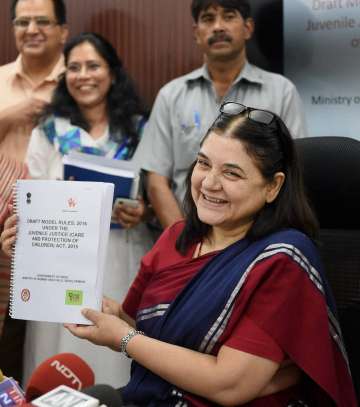Juvenile Justice act: No handcuffs, no jail for minors, corporal punishment to be treated as crime
New Delhi: No child between 16 and 18 years of age in conflict with law will be handcuffed or sent to jail or lock-up, according to the draft rules of Juvenile Justice Act 2015 that

New Delhi: No child between 16 and 18 years of age in conflict with law will be handcuffed or sent to jail or lock-up, according to the draft rules of Juvenile Justice Act 2015 that was released on Wednesday.
Moreover, any kind of corporal punishment meted out to children in child care homes as well as selling of psychotropic substances such as tobacco and alcohol to them will soon come under the ambit of crimes against children.
The rules that were released by Women and Child Development Minister Maneka Gandhi prescribe detailed child friendly procedures for police, Juvenile Justice Board and Children's court to deal with children in conflict with law.
According to the draft rules, no child shall be subjected to corporal punishment or any mental harassment, including being subjected to humiliating behaviour affecting the dignity and worth of the child.
According to the draft rules, proper medical and legal aid will be provided to juvenile criminals and their parents and guardians will be duly informed.
"The Board and the Children's Court are to adhere to the principle of best interest of the child and the objective of rehabilitation and reintegration of child in the society," Gandhi said, after releasing the draft rules.
The Juvenile Justice Act, 2015, was passed by Parliament in December last year in the aftermath of the release of the juvenile convicted in the gangrape and murder of a para-medical student in December 2012.
‘Place of safety’
According to the rules, every state government is required to set up at least one 'place of safety' for the rehabilitation of such children. The rules prescribe for extensive services to be provided to such children through regular monitoring.
The rules were drafted by a multi-disciplinary committee comprising a senior judge and advocates, members of Juvenile Justice Board and Child Welfare Committee, representatives of state governments, mental health experts and civil society members.
More offences included
Several new offences against children have also been included in the Act such as sale and procurement of children for any purpose, corporal punishment in child care institutions, use of child by militant or adult groups, giving children intoxicating liquor or narcotic drug or psychotropic substance or tobacco products.
It also prescribes detailed procedures for determination of age. The JJB or Juvenile Justice Committee will determine the age of the child within 30 days from date of submission of application.
"Wherever medical opinion is required, same will be sought from a duly constituted medical board for which all government hospitals will constitute medical boards on permanent basis. Where medical boards give a range of age, the age of the child on lower side will be considered in order to give benefit to the child," the official said.
The preliminary assessment will be conducted by JJBs within three months with the assistance of psychologists or psycho-social workers or other experts. There will be provision of appeal to the Children's Court for those who are aggrieved by the order of the Board, the draft rules say.
"Children's court will interact with the child in order to evaluate whether the child has undergone reformative changes and if the child can be a contributing member of the society. The Court and Board will keep in mind the principle of best interest of the child and the objective of rehabilitation and reintegration of the child in the society," a senior ministry official explained.
The draft rules submitted by the committee were reviewed by the ministry and, after a thorough review, comments have been invited on the draft rules from all stakeholders, official said.
PTI inputs